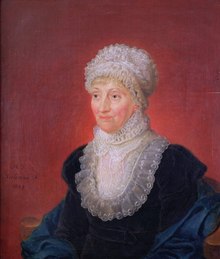
Back Caroline Herschel Afrikaans كارولين هيرشل Arabic كارولين هيرشيل ARZ Carolina Herschel AST Karolina Herşel Azerbaijani کارولینه هرشل AZB Caroline Herschel BS Caroline Herschel Catalan کارۆلین ھێرشێل CKB Caroline Herschel Czech
Caroline Herschel | |
|---|---|
 Caroline Herschel at 78, one year after winning the Gold Medal of the Royal Astronomical Society in 1828 | |
| Born | Caroline Lucretia Herschel 16 March 1750 |
| Died | 9 January 1848 (aged 97) Hanover, Kingdom of Hanover, German Confederation |
| Nationality | German |
| Known for | Discovery of several comets |
| Relatives | William Herschel (brother) |
| Awards | Gold Medal of the Royal Astronomical Society (1828) Prussian Gold Medal for Science (1846) |
| Scientific career | |
| Fields | Astronomy |
Caroline Lucretia Herschel[1] (/ˈhɜːrʃəl, ˈhɛər-/;[2] 16 March 1750 – 9 January 1848) was a German-born British astronomer,[3] whose most significant contributions to astronomy were the discoveries of several comets, including the periodic comet 35P/Herschel–Rigollet, which bears her name.[4] She was the younger sister of astronomer William Herschel, with whom she worked throughout her career.
She was the first woman to receive a salary as a scientist and the first woman in England to hold a government position.[5][6] She was also the first woman to publish scientific findings in the Philosophical Transactions of the Royal Society,[7] to be awarded a Gold Medal of the Royal Astronomical Society (1828), and to be named an honorary Member of the Royal Astronomical Society (1835, with Mary Somerville). She was named an honorary member of the Royal Irish Academy (1838). The King of Prussia presented her with a Gold Medal for Science on the occasion of her 96th birthday (1846).[8]
- ^ "Caroline Herschel - Biography, Facts and Pictures". 25 October 2022. Retrieved 10 September 2023.
- ^ "Herschel". Random House Webster's Unabridged Dictionary.
- ^ "Caroline Herschel | Biography, Discoveries, & Facts | Britannica". 5 January 2024.
- ^ Nysewander, Melissa. Caroline Herschel. Biographies of Women Mathematicians, Atlanta: Agnes Scott College, 1998.
- ^ Cite error: The named reference
ReferenceBwas invoked but never defined (see the help page). - ^ Cite error: The named reference
Ogilviewas invoked but never defined (see the help page). - ^ Schiebinger, Londa (1989). The mind has no sex?: women in the origins of modern science. Cambridge, Mass.: Harvard University Press. p. 263.
- ^ Herschel, Caroline Lucretia (1876). Herschel, Mrs. John (ed.). Memoir and Correspondence of Caroline Herschel. London: John Murray, Albemarle Street.